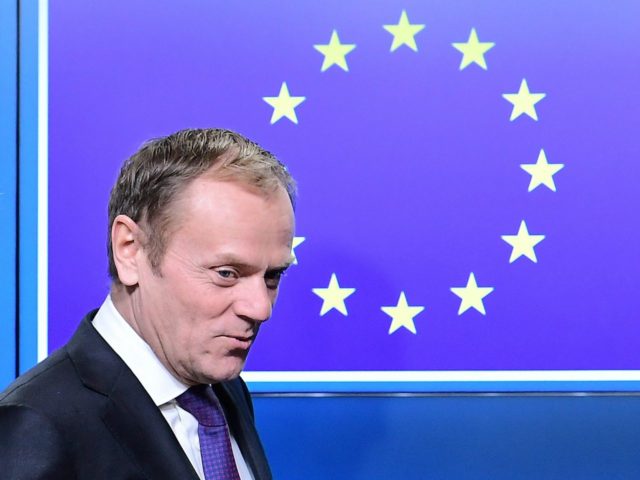BRUSSELS (AP) — Donald Tusk is closing in on a second term as the European Union’s Council president despite fierce opposition from Poland’s most influential politician, a bitter rival of the former prime minister.
Tusk’s 2½-year term in one of the EU’s most prestigious jobs, as the chairman of summits of the bloc’s 28 leaders, ends May 31. An EU summit is due to elect the president for the next term Thursday.
Poland’s nationalist government, which has often been at odds with Brussels and EU partners, has proposed little-known Polish EU lawmaker Jacek Saryusz-Wolski to replace Tusk. But by Wednesday, diplomats from several member nations said it was clear that Warsaw has little or no support while Tusk has strong backing.
Poland’s government argues that Tusk supports the domestic opposition in Poland and has failed to protect the country’s interests in the EU.
Malta, which holds the EU’s rotating presidency, will be looking right up to the beginning of Thursday’s summit for a way to preserve the consensus and have everyone back one candidate, but several other diplomats said the most likely option would be Tusk winning by a large majority.
The diplomats spoke on condition of anonymity since the issue was still unresolved. A senior German official said that Chancellor Angela Merkel “appreciates the work” of Tusk and that he assumes he will be re-elected Thursday with “overwhelming support.”
Most EU nations want quick approval of Tusk since the EU is already facing so many issues that a drawn-out succession process would further damage the bloc.
The heart of the problem appears to be long-standing rivalry and animosity between Tusk and Jaroslaw Kaczynski, the leader of Poland’s governing Law and Justice party. Kaczynski accuses Tusk of contributing, through lax security, to the death of his twin, President Lech Kaczynski, in a plane crash in 2010.
Kaczynski told Poland’s TVP Info television on Tuesday that Tusk is “totally unacceptable” for Poland, accusing him of “breaking the basic EU rules, the rules of neutrality toward internal matters of member nations.”
Asked what will happen if Tusk is re-elected, Kaczynski said “it will be a completely different union” because it would be the first time the leader of the European Council is elected against the will of his own country.
There is precedent, however, for top officials to be chosen without unanimity. In 2014, EU leaders nominated Jean-Claude Juncker as head of the bloc’s executive Commission against the votes of Britain and Hungary.
Tusk said that he wasn’t responsible for any “clashes.”
“I am, and I should be also in the future, impartial and politically neutral (toward) all 28 member states,” he said. At the same time, he added, “I am also responsible for protecting European values and principles.”
Poland’s intervention may even have galvanized support for Tusk at a time when the other top positions in the EU, the presidency of the Commission and the European Parliament, are also in the hands of his center-right European People’s Party.
France’s socialist president, Francois Hollande, said earlier this week that he had no reason to back off supporting Tusk “even if, with a view to political balance, it would be the turn of a socialist – I try to have a vision that is more European than partisan or national.”
“I will not participate in this eviction,” Hollande told French daily Le Monde and other European newspapers in an interview published Monday.

COMMENTS
Please let us know if you're having issues with commenting.